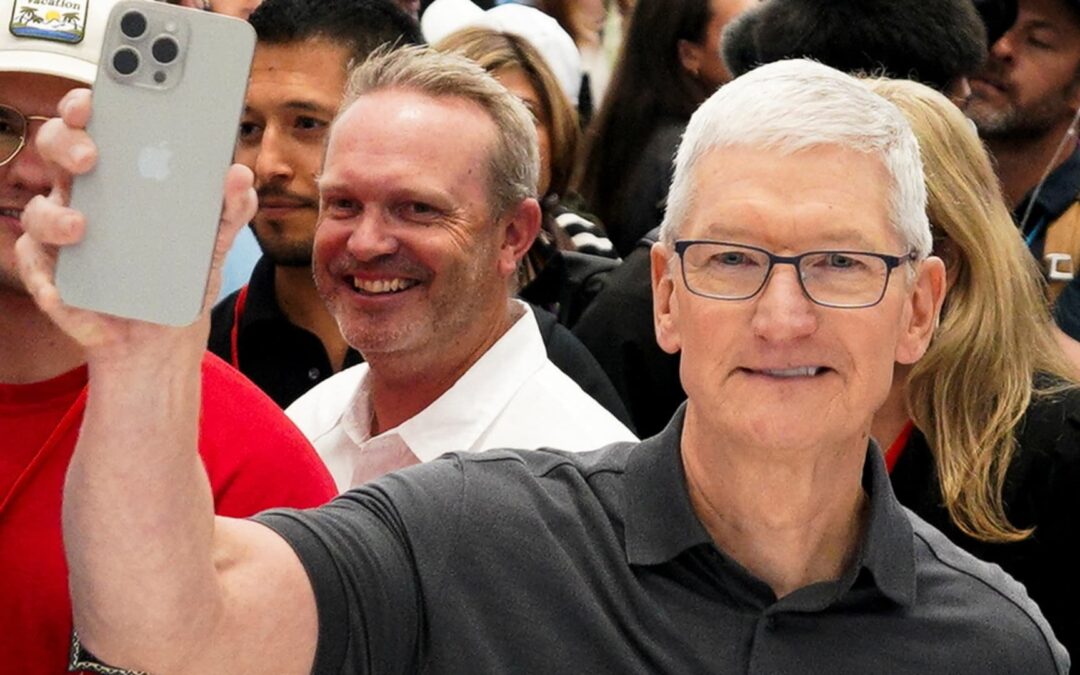Apple CEO Tim Cook holds a new iPhone 15 Pro during the ‘Wonderlust’ event at the company’s headquarters in Cupertino, California, U.S. September 12, 2023.
Loren Elliott | Reuters
As equities soared in 2020 and consumers flocked to trading apps like Robinhood, Apple and Goldman Sachs were working on an investing feature that would let consumers buy and sell stocks, according to three people familiar with the plans.
The project was shelved last year as the markets turned south, said the sources, who asked not to be named because they weren’t authorized to speak on the matter.
The effort, which has not been previously reported, would have added to Apple’s suite of financial products powered by Goldman. Apple first teamed up with the Wall Street bank to offer a credit card in 2019, and then added buy now, pay later (BNPL) loans and a high-yield savings account. The company said last month that the savings account offering had climbed past $10 billion in user deposits.
Representatives for Apple and Goldman declined to comment.
Apple was working on the investing feature at a time of zero interest rates during Covid, when consumers were stuck at home and spending more of their time and their record savings in trading shares, including meme stocks like GameStop and AMC, from their smartphones.
Apple’s conversations with Goldman began during that hype cycle in 2020, two sources said. Their work progressed, and an Apple investing feature was meant to roll out in 2022. One hypothetical use case pitched by executives involved the ability for iPhone users with extra cash to put money into Apple shares, one person said.
But as markets were roiled by higher rates and soaring inflation, the Apple team feared user backlash if people lost money in the stock market with the assistance of an Apple product, the sources said. That’s when the iPhone maker and Goldman switched directions and pushed the plan to launch savings accounts, which benefit from higher rates.
The status of the stock-trading project is unclear after Goldman CEO David Solomon bowed to internal and external pressure and decided to retrench from nearly all of the bank’s consumer efforts. One source said the infrastructure for an investing feature is mostly built and ready to go should Apple eventually decide to move forward with it.
The Apple Card launched with much fanfare three years ago, but the business brought regulatory heat and racked up losses as its user base expanded. Earlier this year, Goldman rolled out a high-interest savings account for Apple Card users, offering a 4.15% annual percentage yield.
Goldman was also central to Apple’s BNPL offering. The product, called Apple Pay Later, can be used for purchases of $50 to $100 “at most websites and apps that accept Apple Pay,” according to the support page. Borrowers can split a purchase into four payments over six weeks without incurring interest or fees.
Before Goldman’s pivot away from retail banking, the company examined ways to expand its partnership with Apple, sources said. More recently, Goldman was in discussions to offload both its card and savings account to American Express.
Had plans for the trading app progressed, Apple would have entered a market with stiff competition, featuring the likes of Robinhood, SoFi and Block’s Square, along with traditional brokerage firms such as Charles Schwab and Morgan Stanley’s E-Trade.
Stock trading has become another way for financial firms to keep customers and drive engagement on their platforms. Apple was pursuing the same approach, one source said. It’s a move that could capture the interest of regulators, who have scrutinized Apple for its App Store practices. Robinhood has also been grilled by regulators for what they described as “gamifying” markets.
Other tech companies have been pushing into the space. Elon Musk’s X, formerly known as Twitter, is working on a way to let users buy stocks and cryptocurrencies through a partnership with eToro. PayPal had plans to launch stock trading after hiring a key industry executive in 2021. But the company abandoned those plans, and said on an earnings call that it would cut spending and refocus on its core e-commerce business.
WATCH: Goldman’s Apple Card faces mounting credit losses







